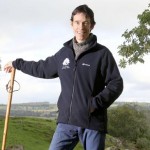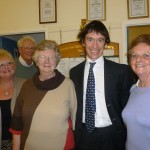HOW CUMBRIA’S VILLAGE HALLS ARE PIONEERING A HI-TECH REVOLUTION
Article first published in The Guardian on 2 January 2011.
This winter, 130 activists gathered to discuss superfast broadband in a village hall in Cumbria. They had come from 100 villages, by 100 paths. Ali had presumably travelled north along the shore of Ullswater, rounded Loadpot Hill and turned south down the Lowther valley, until (three miles from where she began, but 45 minutes by car), she could take the narrow track east across the moor. Brian came over Hartside at 3,000ft, down the switchbacks into Eden, and worked his way along the East Fellside. They were joining a community experiment, which is becoming almost a revolution.
Their problems are distance and isolation. They live in Eden, the most sparsely populated district in England, some of whose villages, like mine at Butterwick, have only seven houses. Bus services are going, fuel costs are high and roads are poor. My neighbour with Parkinson’s has to drive to Newcastle hospital – a four-hour round trip – just to talk to a neurologist. There was once a grammar school in our valley but now there is no primary school: children travel further and find it difficult to stay after class. We are struggling to keep young people, partly because of the low wages (some of our hill farmers have incomes of less than £6,000 a year). The activists were gathering because they believe some salvation may lie in superfast broadband.
Broadband would allow our businesses to follow our local fishing supply shop, which does £1m of sales a year out of the door but £7m online. Farmers could fill forms online; Lake District B&Bs could market themselves in Japan; and “creative” industries that depend on fast internet speeds could grow. Parkinson’s patients could talk to their neurologist by videolink without leaving home (and grandparents could talk to their grandchildren in Canada); children could take classes which they couldn’t find in the district. Village shops could collaborate online to increase their purchasing power; village halls could share bookings; medical teams could exchange emergency calls more efficiently. People might decide again to work and bring their families up in villages.
But until recently, superfast broadband seemed about as likely in Cumbria as long, hot summers. Telecoms giants have tended to concentrate on urban areas where it is far cheaper per head to lay fibre optic cable. One of my neighbours was quoted more than £40,000 to connect his cottage. Governments have favoured centralised contracting with commercial giants and have never really had the money for superfast broadband. Over £100m has gone to improve broadband in Cornwall, but Cumbria is twice as big and difficult. Great Asby village, for example, is 20 km from the main fibre optic cable by the M6, cut off by the Orton scar that once separated the Danish Vikings at Asby from the Norse in the Vale of Lyvennet. A commercial contract could charge £1m for a connection.
But our Eden communities may have the solution. In Great Asby, one volunteer discovered there was already fibre, paid for by the taxpayer, for the school. The school let him splice off the fibre to a cabinet that he calls a “parish pump”. From that he ran a wireless network, with transmitters in the church tower and one, powered by solar panels, on a dead tree to reach the outlying farms. He has persuaded 70% of the village to sign up and is making enough money (as an unpaid volunteer) to upgrade the network. Local farmers have agreed to lay the fibre, at a fraction of the commercial cost. This is not a just impressive technology, it’s astonishing community action. And it suggests a model for rural Britain. The 130 activists who drove to Great Asby are now aiming to replicate it in 100 more villages. They have established a new website – though some of them have to drive to Penrith to log on. Libby, in Kirkby Stephen, is photographing and mapping all existing telecoms cabinets. Freddy, in Morland, is exploring alternative technologies from microwave transmitters and wireless hubs, to laying fibre in sewers. Five out of six farmers around Crosby Ravensworth have offered to forego wayleave charges and help dig trenches. Kate, in Stanwix, is training people to get online. Daniel, in Alston, is piloting medical tests from homes. How far can this go?
As the local MP I held a broadband conference in Penrith last September to show this community approach to Ed Vaizey, the broadband minister and to senior members of Obama’s broadband team (who flew from the States to Penrith). The community model became a carrot and a stick to encourage investment. Because communities can sign up well over 70% of a village to use broadband, they are much more attractive economic propositions. But if companies don’t invest, communities will bypass them entirely and build, own and run their own networks. Companies that would not normally focus on such a remote rural area now did. Virgin Media examined stringing fibre-optic cable along pylons; a Penrith company proposed sending data down electricity lines; and a Carlisle company offered its cable network. BT bid to provide broadband for about a tenth of the price we anticipated. There was even a presentation on how to connect the fellside village of Gamblesby by microwave.
The government has now recognised the Eden communities as the rural “big society” vanguard and announced a broadband pilot, focused on Eden. We have been assigned civil servants and promised money. Government departments have proposed services we could pilot online. A communications giant is developing applications for Eden; Cumbrian businesses are giving secondhand computer equipment to the elderly and volunteers are helping them get online.
But we’re not there yet. We must ensure that the vulnerable are not excluded; that alternative methods of communication, from letters to buses, continue to be supported and that the community networks do not become new monopolies. The technological, commercial, financial and legal problems are vast.
But the Great Asby meeting and website prove the drive of Cumbrian communities. I have little doubt that they will now give the most sparsely populated constituency in England the fastest broadband network in Europe. And that this technological and democratic miracle can spread across rural Britain. And while companies and government struggle to keep up, the activists will continue to muster in Cumbria.





